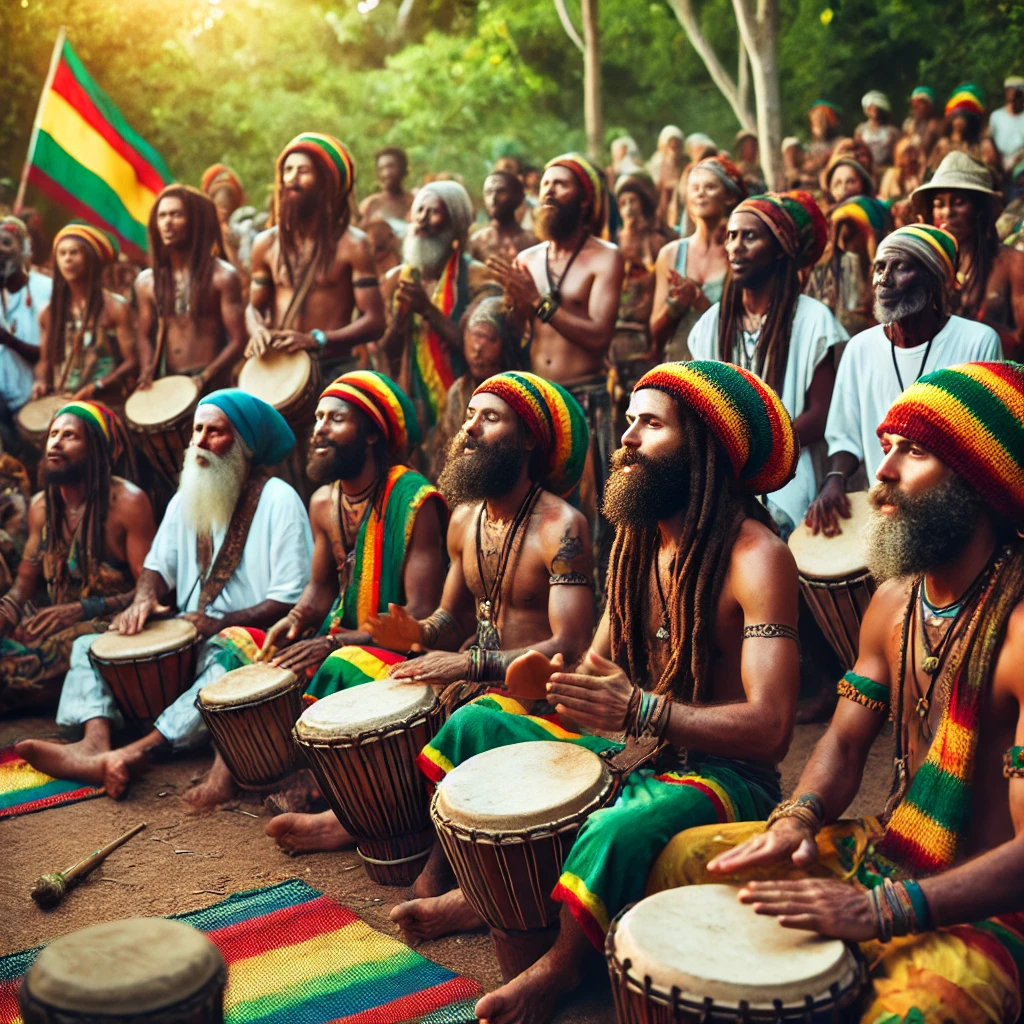Bless up, my brethren and sistren! Today, we’re diving deep into the heart of Rastafarian culture by exploring the various ceremonies and rituals that play a significant role in the spiritual lives of Rastafarians.
Nyabinghi Chanting
Nyabinghi is one of the most important ceremonies in Rastafarian culture. Named after Queen Nyabinghi, a legendary Ugandan leader, this ritual is characterized by drumming, chanting, and singing hymns to praise Jah (God). Nyabinghi gatherings, often held to celebrate significant dates in Rastafarian history, bring the community together to strengthen their spiritual bond and honor their ancestors. The drumming and chanting create a powerful atmosphere, fostering unity and a deep sense of connection to the divine.
Grounation Day
Grounation Day, celebrated on April 21st, marks the visit of Emperor Haile Selassie I to Jamaica in 1966. This day is considered a holy day in Rastafarianism, symbolizing the recognition and validation of the faith. Celebrations typically include music, drumming, feasting, and communal gatherings where followers reflect on the teachings of Haile Selassie I and the principles of Rastafarianism. It is a time for renewing faith and commitment to the Rasta way of life.
Reasoning Sessions
Reasoning sessions are informal gatherings where Rastafarians come together to discuss spiritual, social, and personal issues. These sessions are essential for communal bonding and collective learning. Participants often sit in a circle, sharing insights, experiences, and wisdom. Reasoning sessions are guided by mutual respect and a shared desire for understanding and growth. They provide a space for open dialogue, reflection, and the exchange of ideas, reinforcing the sense of community and spiritual solidarity.
Grounding with the Elders
Grounding with the elders is a practice where younger Rastafarians seek guidance and wisdom from the older, more experienced members of the community. Elders are respected for their knowledge and understanding of the faith, and their teachings are considered invaluable. Grounding sessions involve storytelling, sharing of experiences, and imparting of traditional knowledge. This practice ensures the continuity of Rastafarian traditions and strengthens the generational bond within the community.
Sacred Herbs
The use of sacred herbs, particularly cannabis (referred to as ganja), is an integral part of Rastafarian rituals. Cannabis is considered a holy plant, believed to aid in meditation, spiritual enlightenment, and communication with Jah. During ceremonies, it is often smoked in a communal pipe or chalice. The act of smoking ganja is seen as a sacrament, a means of purifying the mind and body, and enhancing spiritual awareness. It is important to note that its use is always respectful and purposeful, aligning with the sacred nature of the ritual.
Ital Living
Ital living is not just a dietary practice but a holistic approach to life. It emphasizes natural, pure, and unprocessed foods that nourish both the body and spirit. Rastafarian ceremonies often include the preparation and sharing of Ital food, symbolizing unity and respect for life. These gatherings are an opportunity to celebrate the bounty of nature and the health benefits of a natural diet. Ital living extends beyond food to encompass a lifestyle that respects and honors the environment and all living beings.
Music and Dance
Music and dance are central to Rastafarian ceremonies, serving as expressions of faith, joy, and resistance. Reggae music, with its powerful messages and rhythmic beats, is a fundamental part of Rastafarian worship. Songs often praise Jah, recount historical struggles, and convey messages of hope and liberation. Dance, particularly the spiritual dance known as the “holy dance,” allows participants to connect with the divine and express their spirituality physically. These elements create a vibrant, dynamic atmosphere that uplifts the spirit and strengthens communal bonds.
The Selassie Mass
The Selassie Mass is a religious service dedicated to honoring Emperor Haile Selassie I. This ceremony involves prayers, hymns, and readings from the Bible, focusing on the teachings and legacy of Haile Selassie. The Mass is a time for reflection, gratitude, and recommitment to the values of Rastafarianism. It reaffirms the faith of the community and their devotion to living a righteous life guided by the principles of love, justice, and unity.
The Importance of Nature
Nature holds a sacred place in Rastafarianism, and many ceremonies and rituals are conducted outdoors, in natural settings. This practice reflects the belief in the interconnectedness of all life and the presence of Jah in the natural world. Ceremonies often include rituals that honor the elements, such as water, fire, earth, and air, acknowledging their essential role in sustaining life. This deep respect for nature reinforces the Rastafarian commitment to environmental stewardship and sustainable living.
Conclusion
Rastafarian ceremonies and rituals are rich in spiritual significance and cultural heritage. They serve to strengthen the bonds within the community, deepen the connection with Jah, and celebrate the principles of love, unity, and righteousness. By participating in these sacred practices, Rastafarians honor their traditions, nurture their spirituality, and contribute to the preservation and growth of their vibrant culture.

